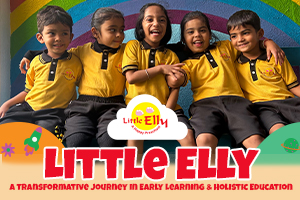Why Summer Holidays Are Important for Children: The Hidden Magic Behind the Break
For kids, summer holidays are pure magic. Long sunny days, no school bells, late bedtimes, and endless adventures—what's not to love? But behind the popsicles and pool parties lies something even more important: the essential role summer holidays play in a child’s development.
Yes, summer break is a time to have fun—but it's also a crucial period for rest, emotional resilience, family bonding, personal growth, and so much more. While schools focus on structure and academic progress, the summer allows children to recharge, explore, and grow in ways that classrooms simply can't.
Let’s examine the science-backed reasons why summer holidays are so important for children and how they contribute to their mental relaxation, creative exploration, and overall childhood development.
1. Mental Relaxation: Letting Minds Breathe
Children need time to mentally unwind after nine months of homework, early mornings, and academic pressures. Summer holidays provide a natural reset, helping kids de-stress and avoid burnout.
A survey by the American Psychological Association found that children as young as nine report feeling significant stress related to schoolwork. Without regular breaks, this can lead to anxiety, loss of motivation, and even academic fatigue.
The freedom of summer encourages children to shift from performance mode to play-based learning, giving their minds space to wander, imagine, and dream. This mental downtime isn’t wasted time—brain recovery time is crucial for future learning success.
2. Outdoor Adventures and Physical Well-Being
With digital distractions and academic demands, kids are moving less than ever. Summer holidays open the doors to outdoor adventures, from biking and hiking to swimming and sports.
According to the CDC, only 24% of children aged 6–17 engage in 60 minutes of physical activity daily, which is the recommended amount. Summer gives families the chance to change this statistic.
Encouraging kids to play outdoors not only boosts physical fitness but also:
- Enhances motor skills and coordination
- Supports a healthy lifestyle
- Increases Vitamin D levels, which improves mood and immune function
- Lowers the risk of childhood obesity
These healthy lifestyle habits form during unstructured play and exploration—not always during gym class.
3. Strengthening Family Bonds
During the school year, quality family time can be hard to come by between work, homework, and extracurriculars. Summer holidays are a golden opportunity for meaningful connection.
Whether it’s a road trip, a movie night, or baking cookies on a lazy afternoon, these moments strengthen emotional security and family bonding time—crucial factors in a child’s emotional development.
According to Harvard University’s Center on the Developing Child, strong family relationships improve a child’s ability to manage stress, solve problems, and thrive emotionally.
When kids feel supported and loved, their self-esteem and emotional resilience naturally flourish.
4. Creative Exploration and Play-Based Learning
Children are naturally curious, imaginative beings—but structured education can sometimes limit this creative potential. That’s where summer steps in.
Unstructured time allows for creative exploration: building forts, drawing, inventing games, or crafting wild stories in the backyard. These moments encourage:
- Problem-solving skills
- Imagination and innovation
- Confidence building through self-directed play
A report by the LEGO Foundation showed that play-based learning supports deeper learning outcomes and contributes to emotional, cognitive, and social development.
When children lead their own learning experiences, they grow into creative, resilient thinkers—skills that will benefit them long after childhood.
5. Exposure to New Experiences and Personal Growth
Summer is a time of personal growth through exploration. Whether kids attend summer camps, travel to new places, or pick up new hobbies, these experiences expand their worldview and enrich their character.
Trying new things like cooking, fishing, painting, or visiting a science museum introduces them to skills and interests they might never discover during the school year. These experiences are powerful tools for:
- Social skill building
- Broadening cultural awareness
- Enhancing adaptability and open-mindedness
Even volunteering or participating in seasonal learning activities can foster empathy, independence, and confidence building—key components of healthy child development.
6. Preventing the “Summer Slide” with Educational Enrichment
It’s true: learning doesn’t stop just because school does.
While children deserve rest, a complete disconnect from academics can result in learning loss, especially in literacy and math. According to a study from the Brookings Institution, students lose up to two months of reading and arithmetic skills over the summer if not engaged in continued learning.
The solution? Make it fun.
- Join summer reading programs at local libraries
- Explore science through nature walks or stargazing
- Practice storytelling, journaling, or creative writing
- Visit interactive museums or science centers
These educational enrichment activities keep the mind active without the pressures of grades or tests—and help ease the transition back to school.
7. Social Skills in New Settings
Children engage with new peer groups outside the classroom in less rigid environments. Whether at camp, in neighborhood playgroups, or on family vacations, summer presents countless chances for social skill building.
Children learn to:
- Share and cooperate
- Navigate social cues
- Resolve conflicts
- Build new friendships
These interactions boost emotional intelligence and confidence, helping kids become well-rounded and empathetic.
The National Summer Learning Association notes that students in summer enrichment programs show improved communication skills and teamwork abilities, setting them up for greater success in academic and social settings.
8. Better Sleep and Emotional Balance
Let’s not overlook the importance of rest. During school, early wake-up calls and homework can wreak havoc on a child’s sleep schedule. In contrast, summer holidays promote healthier sleep patterns, allowing children to get the rest they need to regulate emotions and recharge their brains.
The Sleep Foundation recommends 9–11 hours of sleep per night for children aged 6–13. Sleep deprivation is directly linked to mood swings, behavioral problems, and decreased academic performance.
When kids get enough sleep, they:
- Manage stress better
- Show improved focus and memory
- Have more stable moods
Simply put, well-rested kids are happier and healthier—mentally and physically.
Wrapping It Up: Why Summer Holidays Truly Matter
It’s easy to see summer as just “time off” from school, but it’s so much more. These months offer mental relaxation, creative freedom, physical well-being, and countless chances for social and emotional development.
Summer holidays are where kids learn to be themselves—through unstructured play, new adventures, family bonding, and exploration. They grow not just as students, but as humans.
By embracing the value of summer, we ensure our children return to school not just rested—but inspired, enriched, and more ready than ever to learn and lead.
Trending Now: How Families Are Reclaiming Summer for Childhood Development
Want to make the most of your child’s summer break? Check out our guides on:
- Top summer reading programs to prevent learning loss
- Family-friendly outdoor challenges for physical well-being
- DIY ideas for creative exploration and play-based learning






